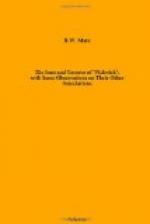[illustration: Garraway’s Coffee House. From a sketch taken shortly before demolition]
Garraway’s is mentioned in other books of Dickens. In Martin Chuzzlewit, for instance, Nadgett, who undertook the task of making secret enquiries for the Anglo-Bengalee business, used to sit in Garraway’s, and was occasionally seen drying a damp pocket handkerchief before the fire, looking over his shoulder for the man who never appeared.
It is also referred to in Little Dorrit as one of the coffee houses frequented by Mr. Flintwich.
In The Uncommercial Traveller, in writing about the “City of the Absent,” Dickens makes this further allusion to the tavern:
“There is an old monastery-cript under Garraway’s (I have been in it among the port wine), and perhaps Garraway’s, taking pity on the mouldy men who wait in its public room, all their lives, gives them cool house-room down there on Sundays.”
Again in Christmas Stories the narrator of the “Poor Relation’s Story” who lived in a lodging in the Clapham Road, tells how, amongst other things, he used to sit in Garraway’s Coffee House in the city to pass away the time until it was time to dine, afterwards returning to his lodgings in the evening.
But of all these references, Mr. Pickwick’s mention of Garraway’s in his note to Mrs. Bardell is the one which will prevent its name and fame from being forgotten more than any other incident connected with it that we know of.
The “White Horse Cellar” from which the Pickwickians set out on the coach journey to Bath stood, at the time, at the corner of Arlington Street, Piccadilly, on the site occupied by the “Ritz” to-day. It was as famous and notorious as any coaching office in London; perhaps being in close proximity to the park and being in the west end, more famous than any.
In those flourishing days of its existence it was the starting-point of all the mails for the west of England, and was a bustling centre of activity. It was, apparently, one of the “sights” of London, for on fine evenings those with leisure on their hands would gather to watch the departure of these coaches. The scene became more like a miniature fair, with itinerants selling oranges, pencils, sponges and such-like commodities, to the passengers and the spectators.
Mr. Pickwick chose to take an early morning coach, perhaps to avoid the sightseers. In his anxiety he arrived much too soon and had to take shelter in the travellers’ room—the last resort, as Dickens assures us, of human dejection.
“The travellers’ room at the ‘White Horse Cellar’ is, of course, uncomfortable,” he writes; “it would be no travellers’ room if it were not. It is the right-hand parlour, into which an aspiring kitchen fire-place appears to have walked, accompanied by a rebellious poker, tongs and shovel. It is divided into boxes for the solitary confinement of travellers, and is furnished with a clock, a looking-glass, and a live waiter, which latter article is kept in a small kennel for washing glasses in a corner of the apartment.”




